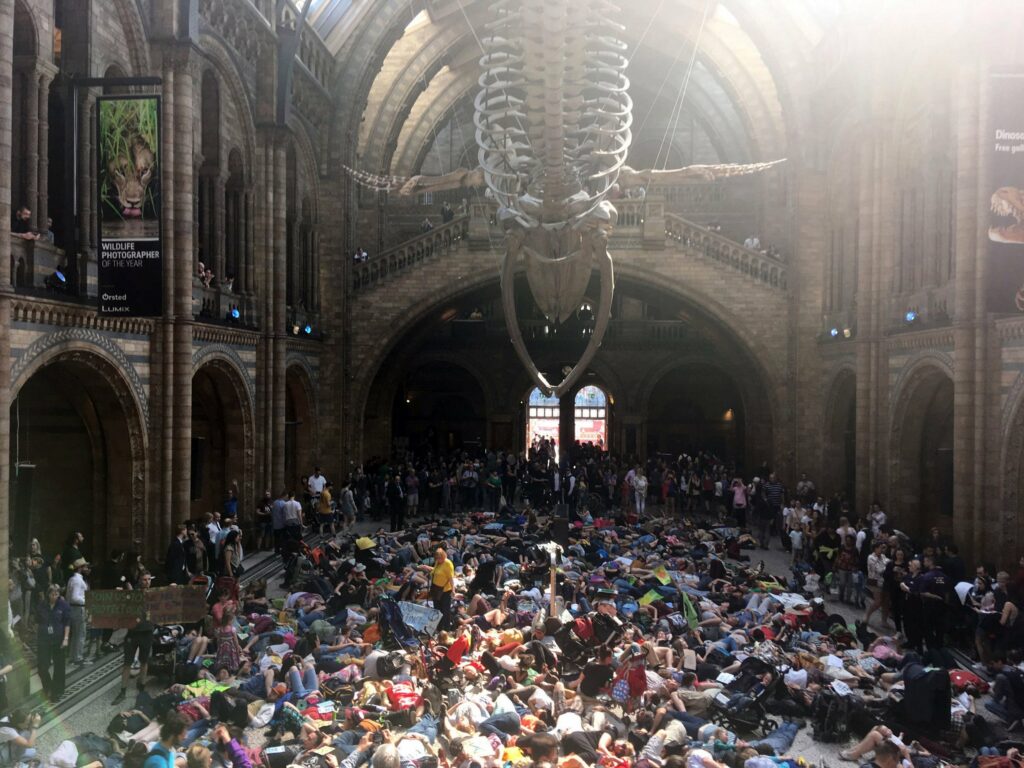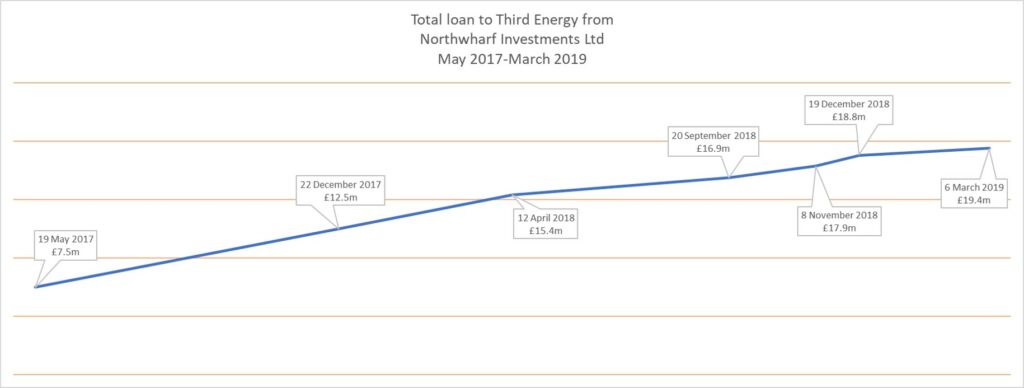
I’m not a particularly political person. Opinionated yes. A little bit right and little bit left, maybe. Not necessarily a centrist, true. And I try to avoid writing about politically motivated movements on this blog, except when they impact the banking industry. And today is one of those days.
Continuing on the Earth Day theme and finance, and particularly for those living in the UK, you cannot have missed the activities over the past few weeks of a group called Extinction Rebellion. They came to public notice in the middle of a Parliamentary debate about Brexit when they bared themselves in the public gallery above the politicians’ heads.
Then they had a mass ‘die-in’ in the Natural History Museum, all dropping dead to the floor at the same moment.
Over 1,000 of the protesters have been arrested during the past week as they stage various marches and activities across the UK. And they’ve been lobbying the MPs as they returned to Parliament on Tuesday to take note.
It cannot be missed, and it’s all about peaceful protest. Their actions are not meant to cause harm. Just to get noticed.
I kind of admire that as yes, climate change and environmental damage are core concerns of mine. The world is abused by humans and can only take so much abuse before it gives up.
But this is not what my blog is for. It’s not for political activism. Unless it affects banks. Have you noticed anything in that space? If not, you may have missed my blog two years ago, about protesters outside Barclays Bank branches trying to stop the bank investing in climate abuser companies. In that case, it is the British firm Third Energy that they had a particular issue with, as Third Energy is leading the charge for fracking Britain (not a Brexit reference).
Interestingly, as I noted two years ago, two years later Barclays has lost no market share in retail banking and has provided even more credit to Third Energy.
So much for protesting against investing in climate abusers. Mind you, according to Companies House records, Barclays PLC is listed as the ultimate parent company of Third Energy Holdings Limited.
Oh!
Now here’s where it gets interesting. The Guardian made a point recently that taxing the masses to reduce climate change is not a great approach, as it can spark off protests like those of the yellow vested gilets juanes. There is another way, as a report released last year showed that just 100 companies have been responsible for over 70% of the world’s carbon emissions since 1988.
These companies only exist because of the bank backing behind them. As The Guardian puts it:
According to the Banking on Climate Change report, the worst offender in Europe is Barclays. Since the Paris agreement was signed at the end of 2015, Barclays has funded the fossil fuel industry to the tune of $85bn, from fracking and coal here in Britain to the Dakota Access pipeline in North America. In each case this funding has been integral to fossil fuel companies undertaking ecocidal projects, sometimes forcefully, against the wishes of local communities.
Oh dear!
In response to all this protest, Barclays issued a policy statement on its approach to climate change in January 2019.
Climate change represents one of the greatest challenges faced by the world today. Banks have an important role to play in ensuring that the world’s energy needs are met while helping to limit the threat that climate change poses to people and to the natural environment.
Banks have a direct environmental and social impact through their operational footprint, as well as indirectly in the way that they mobilise capital, advise clients and develop products. Our aim is to help facilitate the transition to less carbon intensive sources of energy, while supporting economic development and growth in society by helping to ensure the world’s energy needs are met responsibly.
We will continue to keep our approach under review in support of that ambition.
This statement is focused on three areas of activity at Barclays:
- Financing the growth of renewable energy sources and proactively supporting the development of businesses aiming to solve the world’s environmental challenges;
- Taking a responsible and sustainable approach to the necessary financing of sources of energy that are more carbon intensive or those with higher environmental impact; and
- Reducing the carbon footprint of our own operations and supply chain throughout the world.
But the statement is carefully nuanced. For example, the document says that any transaction where proceeds are used for exploration, extraction, processing or transport of tar sands oil – including pipelines – will face “enhanced due diligence”. The bank will also ask firms to prove they have considered the environmental and social impacts associated with their projects.
It doesn’t say it won’t fund them and, bearing in mind that it owns the key controversial climate abuser in the UK, it will more likely happily invest in them.
As Greenpeace put it:
“Barclays is once again choosing short-term profit over human rights and the wishes of a small number of corporate clients over those of tens of thousands of its customers.”
But customers aren’t leaving.
Now, what’s really bad is with all this known anti-Barclays protest for their pro-environmental abuse, they produced this fun new advert for Barclaycard with Simon Cowell:
You may not see any issue here, but environmental campaigners failed to see the funny side, because the ad is set in Antarctica. One of Earth’s most fragile areas facing climate change abuse. Greenpeace made clear what they thought:
“Polar regions are the front line of climate change. Apparently, Barclays are massively unaware.”
Equally Barclaycard's flagship summer concert series in Hyde Park was impacted by the refusal of Neil Young to accept them as sponsor, calling them a "fossil-fuel funding entity". Whoopsies.
Bottom-line is that you, me and all of our friends and family could stop flying, stop driving, stop using plastic and stop breathing, and it wouldn’t make a blind bit of difference whilst banks fund fossil-fuel climate-abusing firms that emit most of the gasses killing our planet.
And a hint of hope?
Well, there is one. When the next financial crisis occurs, it may bring down the big banks because their climate-abusing corporate clients are bankrupted.
Chris M Skinner
Chris Skinner is best known as an independent commentator on the financial markets through his blog, TheFinanser.com, as author of the bestselling book Digital Bank, and Chair of the European networking forum the Financial Services Club. He has been voted one of the most influential people in banking by The Financial Brand (as well as one of the best blogs), a FinTech Titan (Next Bank), one of the Fintech Leaders you need to follow (City AM, Deluxe and Jax Finance), as well as one of the Top 40 most influential people in financial technology by the Wall Street Journal's Financial News. To learn more click here...




